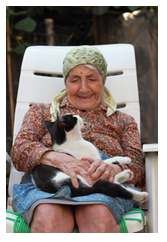- 5 Ways To Avoid A Negative Customer Experience In Your Aging Care Business
- Don’t Look Back and Regret What You Didn’t Do – Aging Care Services Are Growing
- Attitude Is Everything!
- Pam Witt’s 4 Pillars To Goal Achievement
- Use This Formula To Reach Higher Levels Of Success (No Matter Who You Are)
- Using Social Media To Market and Grow Your Aging Care Business
7 Tips to Help Seniors Break Free Of Elderly Social Isolation
Elderly social isolation is a significant and widespread problem.  It speeds up mental decline, and physical decline soon follows. Remaining involved in life is the key to happiness. It stretches the mind, helping it to stay flexible and healthy. The first step is ridding any barriers that may be keeping your elder from being more active. Some common barriers are:
It speeds up mental decline, and physical decline soon follows. Remaining involved in life is the key to happiness. It stretches the mind, helping it to stay flexible and healthy. The first step is ridding any barriers that may be keeping your elder from being more active. Some common barriers are:
- Embarrassment about urinary and/or bowel incontinence
- Embarrassment about being hard of hearing
- Poor vision
- Slower reaction time creating fear in driving
- Decreased mobility, requiring help getting in and out of the vehicle
Once the reasons for isolation have been discovered and addressed, it’s time to get your senior active. A home care companion could be the perfect anecdote in helping your senior out of isolation. A few suggested strategies are:
- Help your senior create a positive body image. In taking care of some of the problems mentioned above, your senior may gain back the confidence needed to face the world again.
- Nurture your senior’s independence. Have the home companion drive your senior to where they want to go, or go with your senior on public transportation. This will help your senior regain a feeling of independence and will improve social health.
- Nurture your senior’s social support system. Make sure your senior is able to stay in contact with friends and family. A home care companion can assist with staying in touch with loved ones by letters, emails, phone calls, and social media.
- Nurture your loved one’s sense of purpose. A home care companion can assist your loved one in re-engaging in hobbies, such as baking, or taking them to exercise class. Perhaps your senior can volunteer at the local senior center.
- Nurture your loved one’s spirituality. If church is important to
 your loved one, arrange so that they can go to church. Going to church can help nurture your senior’s sense of purpose as well as benefit his or her social network.
your loved one, arrange so that they can go to church. Going to church can help nurture your senior’s sense of purpose as well as benefit his or her social network.
- Give your senior something to nurture, such as a plant or a pet. A home companion can help your senior care for these.
- Encourage your loved one to go out and eat with others. A home care companion can help in coordinating visits, outings, and trips, and facilitating visits with family and friends.
I’d love to hear more suggestions on how to encourage seniors to be more socially active. What suggestions do you have to help seniors break free from isolation?
















Bluebird
January 14, 2015 at 7:03 am
Loneliness and depression are typical feelings that the elderly have because of the great changes in their health and well-being. But you can avoid such if you expose the senior to social circles like family and friends, among others. Supposing you are a care worker, you can do your duties but you must also give the elders space to do things themselves because that can boost their esteem.